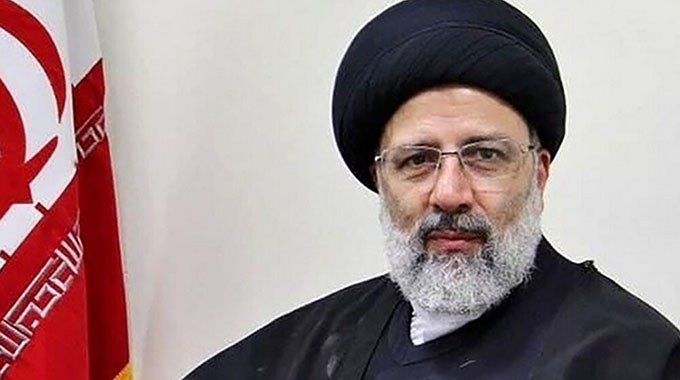Keeping Martyr Raisi’s Legacy Alive
When a leader who stands for social justice dies, especially in the global South, on many occasions Western media organisations have tried to ‘construct an evil man’ out of the hero hailing from the developing world.

Keeping martyr Raisi’s legacy alive
Herald Correspondent
When a leader who stands for social justice dies, especially in the global South, on many occasions Western media organisations have tried to ‘construct an evil man’ out of the hero hailing from the developing world.
What is now enlightening is that it is now known in the global South that the West has been using one script to demonise the leaders from the South. The West has employed an ages-old script in which they only change facts, statistics, images and figures.
This, through what they intended to do on the late Iranian President Dr Ebrahim Raisi, they also did on the late Presidents Hugo Chavez of Venezuela, Fidel Castro of Cuba and Robert Gabriel Mugabe of Zimbabwe. What made this quartet outstanding was standing on the solid principle of non-interference, sovereignty and equality among nations. There are a lot of misunderstandings that the West have about the global South.
It explains why Iran, Cuba, Venezuela and Zimbabwe are despised by the Western media and elite establishment.
When a country has difficulties with the so-called “international community”, it means that the problem is with the US, its allies, and perhaps a few other willing governments or governments forced to align themselves or to cut a deal with them. Thus, for example when it is said that the “international community” is suspicious of Iran’s real intentions regarding its nuclear program, it really means that the United States and its western allies have a problem with Iran.
In other words, the world is often viewed in a decidedly Eurocentric manner, a condition which has existed for centuries in much of Europe and later on in the United States. Such is how the West wanted the rest of the world see President Raisi.
The death of Dr Raisi has shown that the Islamic Republic of Iran is a very powerful country. It is a powerful country militarily, institutionally and socio-economically that it has long captivated the attention of many who fail to appreciate the Persian power and often examine its calmness with a lot of misunderstanding.
The society in Iran has over the past century managed to shape the formation of their national identity and, significantly, the role of its people in defining the contours of that identity.
It is this identity that shaped the popular and iron-willed character of martyr Raisi and his compatriots in a helicopter crush on May 19, hence the popular saying that those we love are dying so soon and leaving too quickly.
While the West tried to reconstruct his identity, the global South and the people of Iran, because they know their heroes, in that solidarity stood to protect the great works by martyr Raisi. The legacy that the late President Raisi was building has been misread in the West, but understood in the global South.
One of President Raisi’s most impressive achievements for Iran was on foreign policy engagements. He is credited for improving relations with other countries, particularly in the region, and took a more diplomatic approach to international relations.
The United States attempted to isolate Iran for decades. Under former President Barack Obama they first instituted the “maximum pressure sanctions”. This also happened and continued under the leadership of President Donald Trump and Joe Biden when those “maximum pressure sanctions” were revived.
Through such pressure campaigns aimed at coercing countries to change their foreign policy behaviour, this has been a part of American foreign policy since the end of the Cold War. And, Washington has previously used similar pressure campaigns against countries like Cuba, Libya, Iraq, and North Korea.
In Iran, the US has been using a three-pronged approach that includes exerting pressure that compels Iran to make compromises; encourage regime change via domestic uprisings; and diminish resources in order to weaken the Iranian government leading to its collapse. But Iran is not on the verge of collapse and has not stopped its regional and global activities to enhance cooperation.
At a time the US did its best to keep Iran and its allies isolated, martyr Raisi provided a decisive and firm leadership style which helped stabilise the country during times of such scenarios instigated by the US.
It should also be remembered that when the USA occupied Afghanistan in 2001 and Iraq in 2003, it meant that Iran was militarily surrounded and was under economic siege. However, under President Raisi’s leadership, Iran joined the Shanghai Cooperation Organisation, thus moved the country towards greater Asian integration, again sidelining and marginalising the West. Such was his ability to make tough and necessary decisions even in the face of opposition.
It was during his time that Iran also pursued the policy of better relations with neighbours through the late Foreign Minister Dr Hossein Amir-Abdollahian who was an expert in Arab relations, friends and neighbours. For instance, there was rapprochement with Saudi Arabia and improved ties with Egypt as well.
In view of that, the world saw Iran join the BRICS bloc in January 2024. That was key because Iran has been leading the fight to create an independent means of trade, investment and business which does not fall under the control of Western financial institutions or the US dollar.
Therefore, during his three years in power, a huge amount of change took place across the globe and Iran has been key in every part of this change and that was largely to do with President Raisi’s leadership.
